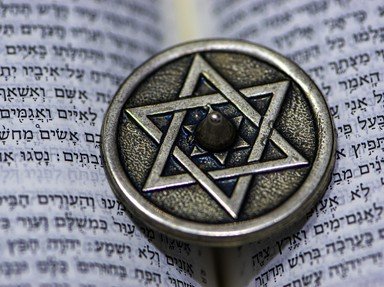Quiz Answer Key and Fun Facts
1. Rule #1: Never try to decide Christmas's date according to the Jewish calendar. First off, it changes every year, and second, everyone knows December 25, so why bother to change it? Use the Hebrew calendar for Jewish holidays, which stay the same each year. For example, which festive holiday begins on the 25th of Kislev?
2. Rule #2: Don't point out that Jesus was Jewish, because no one's really interested. Of course, as a Jew born on Christmas, Jesus would have had a bris some time after. On which important secular holiday would the Circumcision of Christ have occurred?
3. Rule #3: Christian children are taught that the gifts they receive for Christmas depend on their behavior throughout the year. It is a day when people think back on their sins and try to atone for them, in order to end the year in a peaceful, festive spirit. Which Jewish holiday shares this custom of remembrance and atonement of sins?
4. Rule #4: Christmas symbolism abounds in present-day culture during the holiday season, and while some of it can be garish, don't pretend that Jews don't have their own images of certain holidays. While Jews don't possess anything close to Santa Claus, the late winter/early spring festival of Tu B'Shvat is also full of symbolism. Which symbol of Christmas would fit in well with the Jewish holiday of Tu B'Shvat?
5. Rule #5: Never say that Christmas stole the tradition of gift-giving from Hanukkah, because that debate's never going to end. However, there is evidence that the giving of "gelt" originated with the festival of Hanukkah. Today, which best describes the sweet gelt given on Hanukkah?
6. Rule #6: Don't point out that Jews wrote all of the famous Christmas songs, even if they did. On the contrary, though, some Christians wrote the famous Hanukkah songs. Actually, "The Hanukkah Dance" is a song written by which famous non-Jewish songwriter of "This Land is Your Land"?
7. Rule #7: Don't drink eggnog, and especially not with alcohol. The consumption of alcoholic eggnog on Christmas is similar to a custom on another Jewish holiday, where observers are actually instructed to get so drunk that they cannot discern the difference between "Blessed is Mordecai" and "Cursed is Haman". Which Jewish holiday is this?
8. Rule #8: Watch out for that Christmas dinner. It's perfectly fine to celebrate with a festive meal with family or friends, but there's a traditional food on the typical Christmas menu that's a no-no for observant Jews. What staple of dinner is certainly not kosher?
9. Rule #9: Indulge. It is the holiday season, and everyone loves a sweet dessert now and then, which is certainly customary at the end of a Christmas meal. On which Jewish holiday, which traditionally marks the end of one reading of the Torah and the restart at the Book of Genesis, is the consumption of chocolate and apples particularly encouraged?
10. Brandon Walker created a huge Internet sensation with a 2007 video describing a Christmas holiday tradition for Jews, with the title "____ Food on Christmas".
Rule #10: On Christmas, American Jews eat what type of cuisine, mainly because it's the only type of restaurant open?
Source: Author
adams627
This quiz was reviewed by FunTrivia editor
CellarDoor before going online.
Any errors found in FunTrivia content are routinely corrected through our feedback system.

